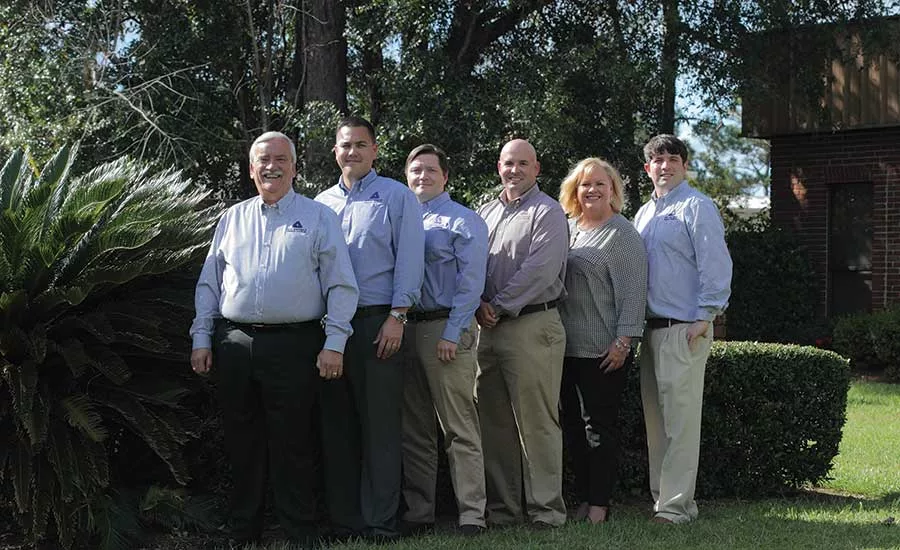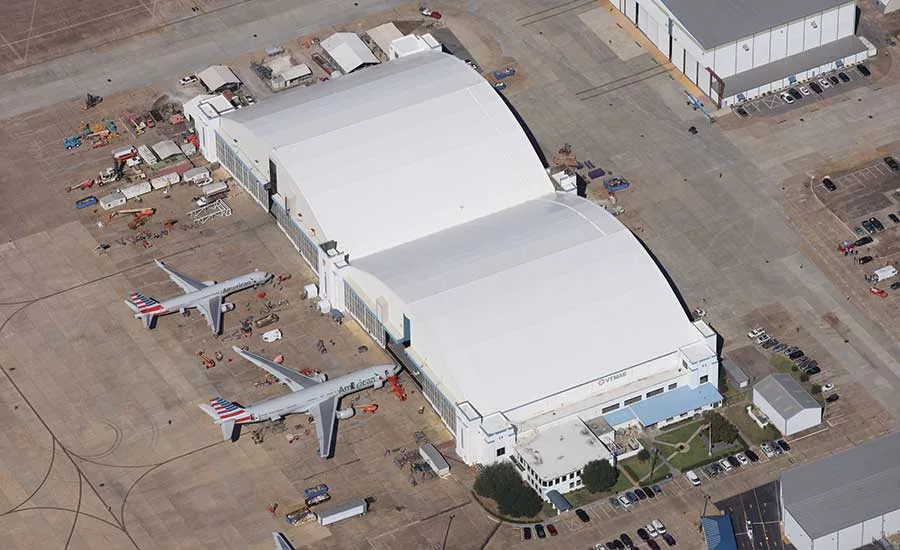Mid-Western Commercial Roofing, Inc.: Tough as They Come
Quality Service, Honesty and Great Workmanship Carry Mid-Western Commercial Roofing, Inc. well into its Fourth Decade in the Deep South.


The VT Mobile Aerospace Engineering Inc. Hangar roof located at the Pensacola International Airport is among Mid-Western Commercial Roofing’s highest profile — and most challenging projects. “Just figuring out how to roof this building in the best way and getting it done was one of the best experiences,” said Owner George Bock Jr. Photo by Thigpen Photography.
The late 20th century was a time of profound change in the United States, and if the pundits gathered to pick which of the 50 states underwent the most significant transformation during that time, it’d be hard to argue against Alabama.
Historically one of the country’s largest producers of agricultural products ranging from cotton to livestock, America’s 22nd state — known best as the “Heart of Dixie” — is now an emerging technological hub drawing some of the best and brightest talent from around the globe in numerous industries including aeronautics, automotive, and information technology.
Socially, until the end of Jim Crow laws and segregation in the 1960s, Alabama was the epicenter for the Civil Rights movement that changed the South — and the rest of America forever.
George Bock Jr. has been there to see it all. The life-long southerner witnessed the evolution of the country’s tumultuous drive toward true equality first-hand, and as a business owner for the past 45 years has watched the state reinvent itself from an agro-economy to a bonafide powerhouse in advanced manufacturing and technology.
“I’ve been around long enough to see a lot of changes around here,” Bock said. “Things have gotten a lot more competitive.”
And that includes the roofing market in Alabama, which due largely to the recent business boom is now home to nearly 5 million people — making it the 24th largest state in the country. Not only does that impact the housing demand in major population centers like Birmingham, Montgomery, and Mobile, but as the state continues to compete for high-paying jobs to solidify its place as an advanced manufacturing and technology hub, the desire for more facilities with distinctive roofing needs appears only to be growing.
Going Big
Bock said that transitioning from an economy that was largely agriculturally based to a more diversified economic landscape that mixes automotive, manufacturing, finance and aerospace requires specialties in several areas when it comes to commercial and industrial roofing. He’s managed to capitalize on that, growing the business by staying laser focused on commercial and industrial work.
Bock also hasn’t shied away from big opportunities. Among several company milestones, he said one that stands out is landing his first corporate account that had multiple locations across state lines. The company’s success led to other accounts all over the region and drove Bock to think big about his business.
A self-starter with a lot of initiative, but not a lot of experience in roofing — or running a business at all — Bock knew he had to earn his place in the local roofing market the only way he knew how, through hard work and unwavering perseverance. He said he carved a niche for himself by taking the tough jobs other roofing contractors wouldn’t take on.
“I was 20 years old looking for a business opportunity,” Bock said of how he entered the roofing industry. “A friend worked with Upjohn Chemical and set me up to do roofing.
“Doing tough jobs that no one else wants is what we have broken our teeth on.”
More than four decades later, the philosophy Bock instilled company-wide still exists. So does his attitude toward building lasting relationships with customers, which is based on high-quality service, honesty and great workmanship.
Scott Paper Co., Con-Agra Foods, Reynolds Metals Co., Sysco Systems and Siemens Energy & Automation are among the household names that populate Mid-Western’s current client list. That’s not too bad for someone without any strong family background in the industry, and one who acknowledges that he essentially fell into a career path in roofing.
Quality and Safety
Part of maintaining the company’s continued success is ensuring employees are happy and productive. That’s accomplished several different ways, none more important that following Bock’s interpretation of the “Golden Rule.”
“Always treat customers with the same respect you expect and stay on top of quality,” Bock explained.
There’s one simple notion to ensuring quality, and what he proudly calls a 99 percent approval average on installed roofs: Triple check everything.
“First the crew checks the work, then our foreman checks the work, and finally the superintendent checks the job,” Bock explained. “After all these inspections take place we call the manufacturer in to check the roof.”
Another priority is simply making sure employees have all the tools needed to be successful. Bonuses are issued to field staff based on job performance, and Bock said the company offers year-end bonuses to mangers that earn them.
With the help of manufacturing partners and their trusted insurers, safety training remains a staple at Mid-Western, Bock said. All managers, estimators, superintendents, foreman go through training for their certification with the Occupational Safety and Health Administration (OSHA). Weekly safety meetings with crewmembers on various jobsites is mandatory, and they work to keep pace with proven techniques and enhancements in safety products and technology.
“We constantly make sure our safety equipment is in good shape and replace when necessary,” Bock said. “We have onsite training for our superintendents, foreman and crews on new products and safety. These training sessions are sometimes provided to us through our manufacturers and also by management.”
World’s Best Partner
Mid-Western’s relationships with roofing materials manufacturers is among its strong points. None appears to be as significant as the bond with Duro-Last. Bock’s association with the Michigan-based company began in 1999, and he said he’s not shy about the relationship, either. He urges visitors to the company website to look no further “When you need the world’s best roofer to install the ‘World’s Best Roof.’”
“We have great relationships with our manufacturers and suppliers,” he explained. “They change over the years, but Duro-Last has helped us achieve success over the years with an excellent product and great customer support.”
Bock points to the company’s product durability as one big reason for its popularity.
“We do a lot of large roofing projects all over the Southeast and Midwest, and we were looking for a material that wouldn’t have problems,” he told RC for a story in 2008. “It’s a dependable single-ply. Once we put it down, we don’t have to worry about it.”
Bock finds the warranty is a major selling point with customers. The standard, comprehensive 15-year full warranty is transferable, has no exclusions for ponding water, and provides coverage against consequential damages that result from defects in the roofing material.
“We chose Duro-Last because of the quality of the material and the hassle-free relationship,” Bock said. “We don’t want to spend time and effort getting the product to the jobsite — we want to spend our time and effort selling and installing more product.”
Since the partnership began, Mid-Western has installed nearly 13 million square feet of Duro-Last membrane on projects across the region, earning the company top honors, and high praise from the manufacturer. The company received the manufacturer’s Elite Contractor Award — the highest honor for quality of installation — multiple times.
Despite the appreciation for Duro-Last, Mid-Western’s crews are also leading applicators of other roofing systems — like TPO and EPDM — in their respective markets.
“We specialize in providing solutions to all commercial and industrial roofing problems,” the company website boasts.
The team of 26 non-union employees is also fully trained and certified to install various membrane systems like modified bitumen systems and conventional BUR systems. Mid-Western also has a metal roof division and a metal roof restoration division to cover all the popular roofing needs in the South and Gulf Coast.
Customer perks are individualized and custom-designed roof maintenance contracts; specialized problem solving expertise; 24-hour availability for emergency service and experience with the best roof warranty programs offered in the industry.
Bock said that what’s worked for him over the years might not work the same way for anyone in commercial roofing. However, he did offer a bit of advice to anyone looking to make a name for themselves in their respective market that has the staying power to last four decades, or longer. He reiterated his interpretation of the “Golden Rule” mentioned earlier, and added this sage advice that contractors working closely with facility owners should hold dear, regardless of what changes lie ahead:
“(Get them) to buy the system that fits their needs,” he explained. “Show them that the least expensive bid is not always the best.”
Looking for a reprint of this article?
From high-res PDFs to custom plaques, order your copy today!






